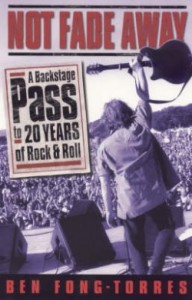Not Fade Away Introduction
March 16, 1999
Dear Ben,
I’m writing to tell you that I will be late with the introduction to your book. Being a brilliant writer, and editor, you’re familiar with all the usual excuses. In fact, you’re an expert, “I’m not feeling well.” “I don’t have my lead yet.” “I need more interview material.” “My tape recorder malfunctioned, and I have to reconstruct everything from memory.” In all your stellar years as music editor for Rolling Stone, besides being one of their most treasured writers, you’ve heard ’em all. Let’s face it. It is impossible to bullshit you, so I’ll just say it straight out: There is too much honor and responsibility in this. I can’t just whip a few paragraphs off. I mean, this is no simple writing assignment, Ben. After all, it’s you – my first real editor.
Do you remember when we first met? As a die-hard rock fan living in San Diego, I smuggled Rolling Stone into my house. My mother, a teacher, was a progressive thinker in so many ways…except one. Rock and roll was not welcome in our home. It was, she said, a waste of brain cells. My first chosen profession, based on loving the movie To Kill a Mockingbird, was to be a lawyer. I wanted to be Atticus Finch, a proud and noble crusader, a pillar of the community. Oh, did this make my family happy. Then rock and roll slipped into my world, courtesy of a rockin’ sister who had returned from a visit to San Francisco with a copy of Big Brother and the Holding Company’s Cheap Thrills. I started buying records on the sly. I read your articles in Rolling Stone, not even realizing you were responsible for assigning and shaping all the other music profiles too. I wanted to interview Crosby, Stills, Nash & Young. I wanted to be you. I began writing about music for my high school paper, and a local underground publication called The Door.
It was dark at that concert in Los Angeles. The Rolling Stones, The Forum, the 1973 concert for Nicaraguan relief. You and Annie Leibovitz were on tour with the band for that great cover story, the one with Mick in the Hawaiian shirt. (Hope it’s included in this collection.) We were introduced by Bobbi Cowan, rock publicist extraordinaire, and one of the many with whom you had a pleasantly adversarial relationship. The Rolling Stones were about to go onstage, and the lights had dimmed. You didn’t see that I was 15 years old. Because of your name, like many others, I had built up an exotic and Salingeresque persona in my mind. But then, there you were. Affable, yet utterly professional. We spoke briefly; I told you I was a freelance writer from San Diego. You asked if I had any interviews in the can, anything I wanted to send you. I suggested the group Poco. You said to send you 750 words, and you also told me to send along some of my tearsheets. I didn’t know what “tearsheets” meant, but I nodded. I knew it had to be good, and we shook hands again. The Rolling Stones were now taking the stage. Mick Jagger ripped into “Oh Carol,” but all I was thinking was I just got an assignment for Rolling Stone from Ben Fong-Torres.
I sent you the story on Poco, and a few days later followed up with a phone call. “It’s Cameron Crowe from San Diego.”
“Crazy,” you said.
“Was the story okay?”
You shuffled through some papers. “It’s fine.” It was that simple. My first story for Rolling Stone. Through I’d written a piece or two for Lester Bangs at Creem magazine, this is when my career as a professional writer began to take off. More assignments followed, including a longer feature on the group Yes. It was during this phase that you called my home, and my sister answered. You spoke with her for a few minutes. You asked her how old I was, and she was only too willing to reveal the precious information I did not want to share with you. “Oh, he’s 16 years old,” she told you. You printed it in the magazine. It was embarrassing to be a journalistic novelty…What the hell, it’s twenty-six years later, I can tell the truth: I loved it. I still run into people who remember the magazine in those early days, such as the personal connection between your readers and the pieces you wrote and edited. They still remember me as the kid writer who was 6. It’s your fault, Ben. It’s all your fault. My mother, who still can’t believe she allowed me to tour with the Allman Brothers Band and Led Zeppelin and David Bowie – all assignments you gave me – is still in mourning that I never went to law school. It’s your fault, and rarely has a month gone by that I didn’t privately thank you for it. But how can I put that in an introduction to your collected book of writings?
A long time ago, staying at your home in San Francisco, struggling with my first full-length feature, you gave me a piece of advice: Be informative, but also be personal. Write as if you were writing a letter to a friend. And so I have. Thank you, Ben.
Love,
Cameron from San Diego
Courtesy of Not Fade Away/Ben Fong-Torres


